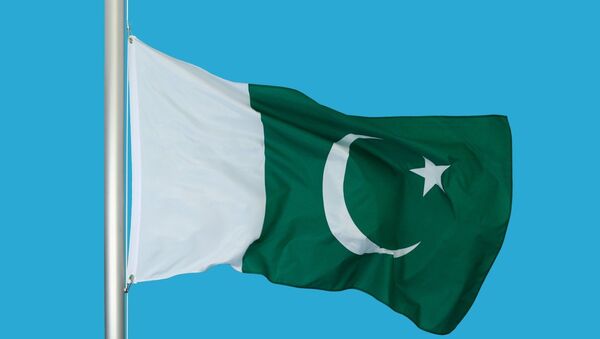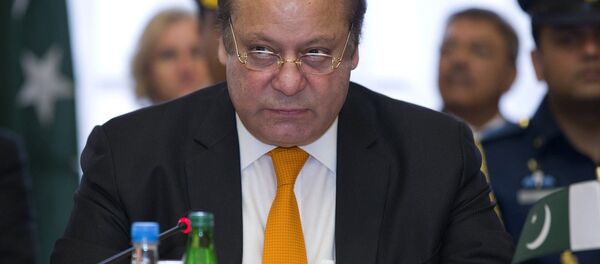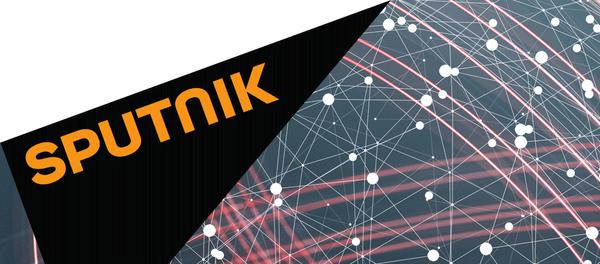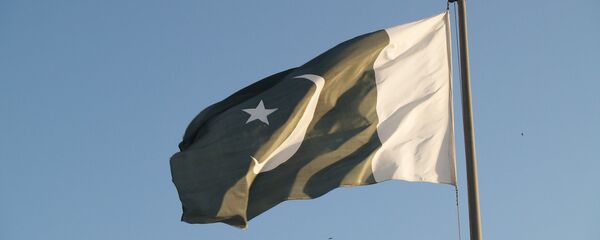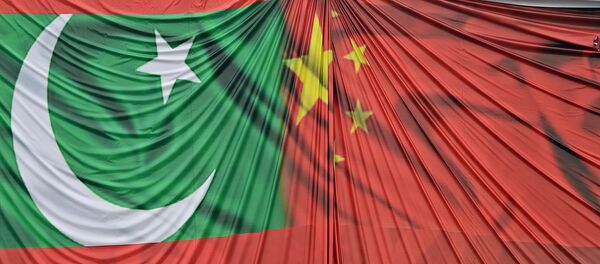Sputnik Radio's By Any Means Necessary spoke with Dr. Marvin Weinbaum, director of Afghanistan and Pakistan studies at the Middle East Institute in Washington, DC, about several of the key players and issues at stake in the sixth most populous country on the planet going into Wednesday's vote.
The Political Field
The main parties at play are the Pakistan Muslim League-Nawaz (PML-N), led by Nawaz Sharif; Pakistan Tehreek-e-Insaf [Pakistan Movement for Justice] (PTI), led by cricketer-turned-politician Imran Khan; and the Pakistan Peoples Party (PPP), led by Bilawal Bhutto Zardari. Another smaller party is Muttahida Majlis-e-Amal (MMA), an alliance of right-wing religious parties, Al Jazeera reported.
Sharif, elected in 2013, resigned in July 2017 after the Supreme Court of Pakistan unanimously voted to disqualify him for public office following corruption revelations connected to the Panama Papers leak, BBC reported at the time.
When Sharif resigned, he was replaced by another member of his own PML-N party, Shahid Khaqan Abbasi. Nasirul Mulk became the caretaker prime minister on June 1 to the agreement of all parties, a special, politically neutral appointment in Pakistani politics designed to ensure free and fair elections occur once Parliament is dissolved, Dawn reported at the time.
Sharif remains the leader of PML-N; however, Sharif and his daughter, Maryam, were arrested July 13 after returning to Pakistan from London, the Independent reported. He was sentenced to 10 years in prison, and she to seven, for corruption. Many believe his return in the face of arrest was a political gamble designed to elicit sympathy from voters.
Weinbaum echoed that sentiment to hosts Eugene Puryear and Sean Blackmon, noting that the PML-N was in large part asking for political support as a protest vote against the military's control over politics. The PML-N's rivals and primary challengers, the PTI, are widely seen as the party of the military in Pakistani politics, the professor noted.
Sputnik News' Andrew Korybko noted on Trendstorm on Saturday that PML-N has cast Sharif's arrest as a witch hunt hatched by the military to tip the elections in Khan's favor.
With more than 105 million eligible voters selecting candidates for 272 directly elected and 70 reserved National Assembly seats across the country, there's a lot at stake. A majority of 137 of the directly elected seats is needed to form a government, although the prospect of a single party winning an absolute majority by itself is very unlikely.
The Day of Decision
Analysts agree that the election will be close.
Sabena Siddiqui, a Foreign Affairs journalist who spoke with Trendstorm, predicted a hung Parliament, meaning that no party will either win an absolute majority or be able to form a majority coalition. Likewise, Weinbaum told By Any Means Necessary that nobody will have a majority, which creates the opportunity for kingmakers to sway politics from the sidelines, whether they be smaller political parties whose demands will have to be shown concern in the formation of a coalition or extra-electoral factors like the judiciary or military. More nefarious methods of influence such as intimidation, bribery or worse might push parties into joining one of the primary coalitions.
"The military has actually had formal responsibility for power — that is, through coup — for a little less than half of the time of the country's existence," Weinbaum noted. "So, the military has been a major player in Pakistan's political life since 1947, although it didn't really come into its own as a political force until the 1950s."
"But even when the military has not been formally holding power, when there have been civilian governments, elected civilian governments, they've always had enormous influence on what happens, particularly in reserving for themselves all policies having to do with security and foreign policy. And also, a veto of sorts over those policies, domestic policies, which impinged on the military itself, above all, the military's budget," Weinbaum said.
"So, they have always been in a position, working through others… they still have this ability to influence politics and influence elections. And one of the charges being made now against the military is that it has stifled the free media — and there is a large media, print and electronic media presence in the country — and they have claimed that they are being forced here to stand within certain boundaries about what they could say, what they could report. So, it's really very widespread, their influence."
Weinbaum noted that "on the other hand, they are an institution of the country which has the respect of most Pakistanis. They are viewed as less corrupt — except when they're in power, they get that charge thrown at them." Khan, leader of the PTI, seen as the military's primary arm in politics, has made a name for himself as an anti-corruption crusader and pushed for the prosecution of Sharif.
"The bottom line here is they have succeeded in convincing people that Pakistan is in danger, principally from India, of course, and they are what provide security and the survival of the state, and therefore they get this deference. But… the military does have a well educated officer corps. It is a formidable organization. It is also an economic organization. It has economic holdings which make it a powerful player in the economy. So you get this ubiquitous influence of the military across the entire political system."
There is also the question of violence in the election. Two terrorist attacks killed hundreds in western Pakistan in mid-July; one killed five and injured 37 in the northwestern town of Bannu, and a suicide bomber in Mastung in Balochistan killed 149 people, including Siraj Raisani, a nationalist leader, and injured at least 200 others, the Independent reported. Violence has also been reported against many other candidates, including many transgender candidates, forcing them to withdraw their challenges for public office, Al Jazeera reported.
Siddiqui noted that the attacks were an attempt to intimidate people into not challenging the status quo, and were in particular directed against ethnic nationalist leaders and minorities.
Historic First: Transgender Candidates, Voters
Another factor in Pakistan's elections that makes them historic is that this is the first national election since transgender people were given civil rights protections earlier this year.
The Transgender Persons (Protection of Rights) Bill 2018, passed in early May, was championed by the PPP, Sputnik reported. Among the numerous protections it extended to transgender and khawaja sira, or third gender people, were the right to vote in elections for all levels of government and an equal right to pursue public office. As a result, several transgender Pakistanis signed up to run in local and national elections.
However, their wave of enthusiasm was dampened by the realization that many trans candidates could not register as transgender in their candidacy forms, spurring renewed cries of discrimination and hypocrisy on the part of the government. "Since our different identity is not being accepted, hence there is no use of contesting the elections," said Neeli Rana, field supervisor at the Khawaja Sira Society. A transgender boycott was announced early last month, and most of the candidates withdrew from the election, Sputnik reported.
Five trans women remain the running for Wednesday's election, Pink News reported Monday. Nayyab Ali, Nadeem Kashish, Lubna Lal, Alamgir (aka Maria) and Zahid Khan (aka Resham) will take part in the July 25 vote. Three of them are running for the National Assembly, and the others are running in provincial elections.
In addition, Pakistan's roughly 500,000 transgender people will be able to vote in these elections for the first time, Al Jazeera reported.
What Comes After?
But the question of the outcome is just as important as the event itself. If the PTI wins, Pakistan's relationship with the US could change.
Khan is on record as being far more critical of the US — not anti-American, but anti-American-policies, he says — than any of the other politicians, Weinbaum pointed out. He's also seen as being soft on the Pakistani Taliban. Likewise, a Khan victory could further sour relations with India, as well as undo the slow gains made between the Pakistani and Afghan governments in recent years.
In terms of China, which calls Pakistan calls its all-weather friend, Siddiqui emphasized the incredible importance of the China-Pakistan Economic Corridor and other mega-projects that require both regional stability and political continuity — although she was careful not to imply that this meant the same people in office — such as water conservation projects and dams.
"A period of real political disruption" is in store for Pakistan, Weinbaum says. "On top of the fact that the economy is also in crisis almost, because of a variety of developments around the fact that it is deeply in debt and has a poor trade balance, a very low reserve currency, foreign reserve currency… We've got a political and economic crisis coming together."
"The election will spur more instability rather than resolving difference."

